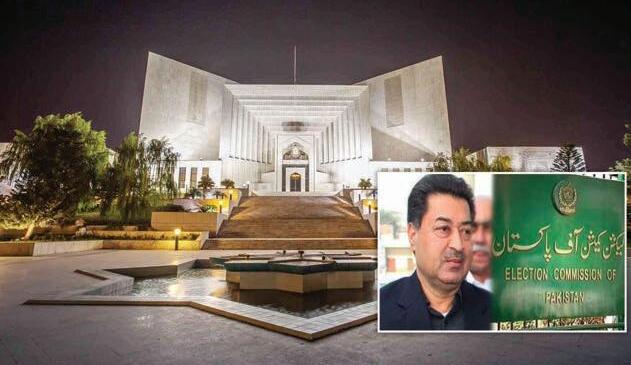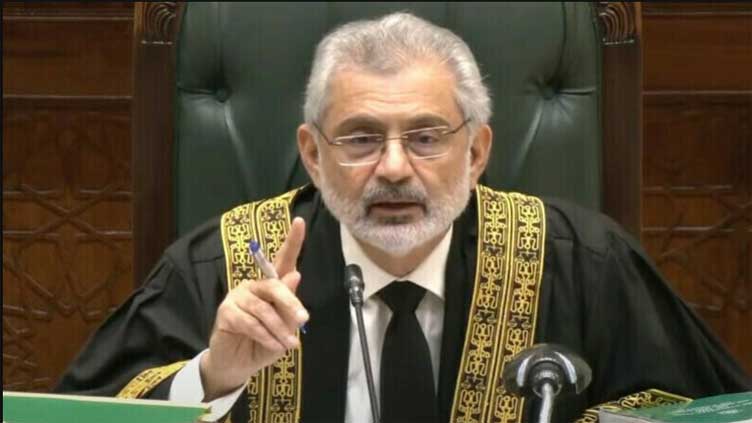
CJP Qazi Faez Isas says if he remains alive, God willing, elections of National & provincial assemblies to be held on Feb 8, 2024 at any cost
Says if Election Commission could not hold elections then it should go home
Says Pakistani people deserve that the general elections are held in the country
Says 15 years ago on the same date of today, the Constitution was transgressed
ISLAMABAD ( Web News )
A day after it agreed to hold general elections in the country on February 8, the Election Commission of Pakistan (ECP) on Friday submitted a notification in the Supreme Court of Pakistan pertaining to the poll date — which has been “set in stone”. “… the Election Commission of Pakistan in exercise of its powers under Article 57(1) of the Elections Act and all other powers enabling it in that behalf, hereby announces February 8, 2024, as poll date for the general elections,” the notification reads.
Meanwhile Chief Justice of Pakistan Justice Qazi Faez Isa has said that the people of Pakistan deserved elections and expressed hope that all the institutions would play their constitutional roles in holding polls. He also urged the ECP to issue the election schedule after completing the preparations. Chief justice said if he remains alive, God willing, elections of National and provincial assemblies will be held on February 8, 2024 at any cost. Chief justice said that if Election Commission could not hold elections then it should go home. He said that Pakistani people deserve that the general elections are held in the country. Chief justice said 15 years ago on the same date of today, the Constitution was transgressed, adding that the process of transgressing continues till date. Chief justice said that we will see if elections are not held on 8th February 2024.
After months of anticipation and uncertainty, the electoral body and President Dr. Arif Alvi agreed on the date for elections on Thursday. The development came after Chief Election Commissioner Sikandar Sultan Raja and members of the Commission visited the Presidency on orders of the apex court, which had taken up pleas regarding elections.
During the hearing, the ECP had proposed Feb 11 as the date for polls but it was asked by the SC to approach the president for consultations. It had also instructed the commission to settle the matter of appointing the election date and inform the court.
On Friday, Attorney General for Pakistan (AGP) Barrister Mansoor Usman Awan submitted the electoral body’s election notification — dated Nov 3 court — to the three-member bench comprising Chief Justice of Pakistan (CJP) Qazi Faez Isa, Justice Athar Minallah and Justice Aminuddin Khan.
After the AGP read out the ECP notification in court, the top judge asked if everyone was happy now. “All the respondents have given their approval,” he noted.
Subsequently, Justice Isa dictated the order of the proceedings. He pointed out that in the letter written to the ECP on September 13, President Dr. Arif Alvi had advised the commission to take guidance from the judiciary regarding polls.
“According to the law and Constitution, the Supreme Court has no role in setting a date for election,” the CJP said, adding that it was surprising that the president had suggested taking guidance on the matter from the court.
“The president could have taken guidance from Article 186 of the Constitution,” he continued. “Constitutional offices like the ECP and President of Pakistan should do what the Constitution says,” Justice Isa said, highlighting that following the Constitution was not an option.
He went on to say that the matter between the ECP and the president was “unnecessarily brought to court”.
The top judge also noted that the country was put through anxiety by not giving an election date. “There were also fears that elections won’t take place at all,” he said.
Justice Isa further stated that the court should not adopt the role of institutions, adding that the SC only facilitated the ECP and president in reaching a conclusion.
He stressed that with higher posts come greater responsibilities, and both the president and ECP were responsible for implementing the Constitution.
“It is now time that we not just follow the Constitution but also look at the country’s checkered constitutional history,” Justice Isa said, lamenting that Pakistan’s institutions and people had to pay for the consequences when the Constitution was violated.
Without naming the PTI chief, Justice Isa said that by dissolving the National Assembly through President Alvi following the no-confidence vote, Imran Khan had created a constitutional crisis.
He also recalled that former SC judge Mazhar Alam Khan Miankhel had previously suggested the president be tried under Article 6 (treason) of the Constitution. “It is strange that the president used powers that he was not entitled to.”
The CJP said running news that creates doubt regarding polls would also be a violation of the Constitution and instructed the AGP to ensure Pakistan Electronic Media Regulator Authority (PEMRA) takes action against such media houses.
The order read that the apex court is fully aware of the constitutional limitations, but mentioned that the entire country was worried because elections were not being announced. The court said it has not interfered with the powers of constitutional institutions like the ECP or the president.
“Every constitutional institution must abide by the Constitution. No constitutional body has the option to deviate from the Constitution,” the order read, adding that the court has only played the role of a facilitator between the president and the commission.
The Supreme Court, in its order, also declared that the president and the ECP must remain in their jurisdictions. “Being the highest constitutional post, the responsibility of the president is greater,” the court stated, adding that no institution can claim to be ignorant of the Constitution as it has passed 50 years to 1973 Constitution coming into force.
“The consequences of every constitutional violation are serious and far-reaching. The effects of which are felt even today,” the order highlighted.
Every constitutional violation, the order stated, has serious effects not only on the people of Pakistan but also on the territory. “Courts have also been entangled in unnecessary matters.”
Referring to the ouster of Pakistan Tehreek-e-Insaf (PTI) Chairman Imran Khan, the court highlighted the significance of the Constitution.
It said that a prime minister was removed by a no-confidence motion in the recent past. “The Constitution is clear that the majority of the members of the assembly can pass the motion of no confidence.”
The order mentioned that a political crisis arose in the country after the no-confidence motion after which the SC took its notice.
“The president dissolved the National Assembly after the no trust was tabled, which was an unconstitutional act,” the order read, highlighting that the president cannot do so on the instructions of the prime minister. “People cannot be kept away from elected representatives,” the order mentioned.
The court stated: “Dissolving the assembly unconstitutionally falls under the category of treason. Constitutional institutions can make important decisions only in the interest of the people.”
It expressed hope that all constitutional institutions will show prudence in the future.
The order mentioned that the president did not have the power to dissolve the assembly but he did, while he did not exercise his power to appoint a date for election.
Furthermore, the chief justice asked the ECP counsel if the electoral authority had issued an election programme.
“The election programme will be announced after the delimitation of constituencies is done,” the lawyer replied.
He added that the delimitation process will be completed on November 30, while the programme will be announced in the first week of December.
The date of the election schedule should be issued for people to stay updated, the chief justice said. “Let there be no misconception that we have given the date of the elections,” he reiterated and subsequently disposed of the petitions.
Speaking to the media after the SC hearing, PTI’s counsel Senator Barrister Syed Ali Zafar, while giving a recap of the hearing, said the apex court had assured elections would be held on Feb 8 and there was no confusion about polls. He said he was pleased that all the political parties had accepted the apex court decision.
“Do you remember how the PDM government opposed all our efforts to hold elections in Punjab and Khyber Pakhtunkhwa,” he recalled. But at the same time, Zafar said, “Let bygones be bygones […] this is the time to look towards the future of a new era that is set to begin.”
“It is our job to ensure elections are free fair and just,” he said. “Everyone should be given a level playing field.” He added that if the PTI was not treated fairly during the polls, it would again knock on the doors of courts.
Meanwhile, Supreme Court Bar Association Chief Abid Zuberi said all the respondents in the case, including the ECP, signed Friday’s order and assured the court that elections would be held on Feb 8.

